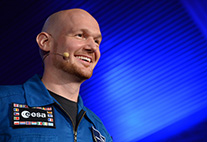Astronaut Alexander Gerst thrills his audience in Hamburg’s Audimax
11 May 2015, by Franziska Neigenfind

Photo: UHH/CEN/Ausserhofer
Last Friday, over 1,500 local residents flocked to Universität Hamburg’s Audimax building to see Alexander Gerst.
Last Friday, over 1,500 local residents flocked to Universität Hamburg’s Audimax building to see Alexander Gerst and listen to the German astronaut report on his “Blue Dot” mission aboard the International Space Station (ISS). The event was not only a special occasion for the enthusiastic audience; when asked about the day at his old alma mater, Gerst commented: “It feels like coming home.”
What does zero gravity feel like? What do deserts, forests and mountain ranges look like from space? For over an hour, Alexander Gerst kept his audience spellbound with amazing images and his own story: from his childhood dream of becoming an astronaut to actually riding a rocket, and to living and conducting research in zero gravity. In the course of his 166 days in space, the researcher completed over one hundred experiments: on behalf of various institutions, Gerst researched new alloys, carried out medical tests and photographed volcanic eruptions. Prior to his talk, Gerst was officially welcomed by Katharina Fegebank, Science Senator for the Free and Hanseatic City of Hamburg, and by Prof. Dieter Lenzen, President of Universität Hamburg.
See videos, tweets and pictures of the event here
Following his presentation, Gerst joined his doctoral advisor, Prof Matthias Hort from Universität Hamburg’s Institute of Geophysics, in a podium discussion. According to Hort, Gerst was the ideal candidate for working in space: he works precisely, can both design and repair, and has an insatiable desire to go out and explore the world. Prior to his astronaut training, Gerst pursued research at the Institute of Geophysics, writing his doctoral dissertation on the eruption dynamics of the Antarctic volcano Mount Erebus. Further podium members included Prof. Detlef Stammer, Director of Universität Hamburg’s Center for Earth System Research and Sustainability (CEN), Prof. Lars Kaleschke, a physicist at the CEN, and Dr. Maurice Borgeaud from the European Space Agency (ESA). All three stressed the importance of satellite-assisted earth system research and thanked their colleague for the contributions he made while in space.
Before the event in the Audimax, Alexander Gerst met with ten students from the “Relli Space Club.” The group of seven- to twelve-year-olds from Hamburg’s Rellinger Straße Elementary School had closely followed Gerst’s mission, which continued from May to November 2014, and learned about different aspects of space travel and research; now they finally had the chance to ask their idol questions face-to-face. Gerst encouraged the children not to give up on their dreams. After all, he never thought he’d actually become an astronaut, but he still gave his dream a chance.
